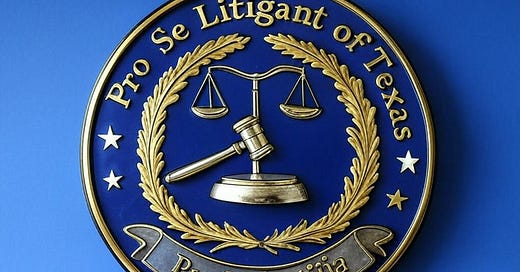The Power of Procedure and Principle
How I Defended My Liberty and Got My Expired Drivers License Case Dismissed in Bastrop County Texas
On March 17, 2025, I walked out of the Bastrop County Clerks office of Precinct One having filed a motion defending myself against a charge of driving with an expired license. The citation alleged violations under Texas Transportation Code §§ 521.021 and 521.026, but I didn’t plead guilty, didn’t hire an lawyer, and didn’t pay a fine. Instead, I stood on principle. I filed a Motion to Quash and Dismiss, citing constitutional due process, procedural defects, and a lack of subject matter jurisdiction. The court dismissed the case ten days later.
But more important than my victory is what it represents: a reclaiming of our fundamental right to travel, and an assertion that the government may not covertly convert liberty into requirement for licensure.
The Citation: A Simple Stop, A Deeper Violation
On November 5, 2023, I was stopped on TX21 in Bastrop County. Texas DPS Officer M. Duarte issued a citation under the Transportation Code for operating a vehicle with an expired license. The citation, like most, assumed compliance. Most people sign and move on—unaware that their signature may carry legal implications far beyond mere acknowledgment.
But let’s talk about a powerful phrase I wish I had added at the time: “Without Recourse.”
Why “Without Recourse” Matters: Legal Theory and Strategy
In legal and financial contexts, “without recourse” is a phrase that limits liability. Under UCC §3-415, when a party signs an instrument “without recourse,” they explicitly disclaim any obligation to guarantee or perform under the terms of that instrument.1
UCC §3-415(b): “If an indorsement states that it is made ‘without recourse’ or otherwise disclaims liability of the indorser, the indorser is not liable on the instrument…”
Now apply that to a citation, which some legal theorists consider a quasi-contractual offer to appear and perform under threat of penalty (which I must assume is accurate, as I never appeared before a judge). Signing a citation “without recourse” means:
You do not waive rights or admit liability.
You do not endorse the jurisdiction or enforcement implied by the instrument.
You transfer liability back to the issuer—meaning the officer may assume personal risk for filing an unverified complaint.
By writing “without recourse” next to your signature, you essentially condition your acknowledgment of the document on non-acceptance of personal liability—a position supported by contract law and reinforced by constitutional due process rights.
Contrary to popular belief, your signature is not always harmless. It can:
Create a presumption of contractual consent.
Function as evidence of jurisdictional acceptance.
In some interpretations, trigger suretyship or performance obligations.
In Cole v. Arkansas, 333 U.S. 196 (1948), the Supreme Court reaffirmed the right to clear notice of charges and an opportunity to contest them—not to be entrapped by presumptive agreements. Signing “without recourse” disrupts that presumption.
Had I written it at the time, I could have argued that the officer acted in a private capacity by pursuing the matter despite a limited endorsement, making him personally liable under doctrines of agency and liability transfer. This creates a powerful deterrent: it may cause an officer to think twice about forwarding an improperly supported or jurisdictionally defective citation.
My Legal Approach: How I Beat the Case
Here’s what I did instead—and what ultimately succeeded:
Demanded a Valid Complaint: Under Texas Code of Criminal Procedure Article 45A.101, the court may not proceed without a sworn complaint made on personal knowledge. A citation is not sufficient.
Filed a Motion to Quash: I cited Ex parte George, 913 S.W.2d 523 (Tex. Crim. App. 1995), establishing the court’s lack of jurisdiction absent a proper complaint.
Asserted the Right to Travel: Based on Kent v. Dulles, 357 U.S. 116 (1958), I argued in a Memorandum of law that non-commercial use of the road is not subject to licensure. “Driving” is a legalese term of art used in commerce—not private travel.2
Applied the Rule of Lenity: Where a statute is vague or overbroad in criminal enforcement, it must be interpreted in favor of liberty, not regulation.
Cited Constitutional Limits on Police Power: Licensing regimes cannot extinguish a right or convert it into a criminal offense (Miller v. United States, 230 F.2d 486 (5th Cir. 1956)).
Below is the PDF of all the filings in the case:
The Court’s Ruling: Dismissed
The court ultimately granted my motion and dismissed the case. Though the judge did not elaborate on the constitutional points, the lack of a proper complaint and clear procedural irregularities were enough it seems.
Still, the larger issue remains: why is the right to travel being treated as a privilege to be purchased and renewed like a gym membership?
Lessons for Those Who Choose to Stand
Never sign anything blindly. Add “Without Prejudice” or “Without Recourse” where appropriate.
Challenge jurisdiction early and often. If they lack a complaint, they lack standing.
Travel is not commerce. Don’t let the State redefine your rights.
Remain respectful, but firm. Pro se does not mean unprepared. Do your due diligence.
Final Thoughts: The Fight Is Bigger Than the Fine
This case wasn’t about a ticket. It was about the State of Texas attempting to criminalize my exercise of a natural right. That’s not just a legal misstep—it’s a philosophical and constitutional overreach that should not be tolerated.
By asserting your rights strategically and intelligently, you may not only beat a citation—you may help restore the proper boundary between free people and the administrative state.
“When injustice becomes law, resistance becomes duty.”
— Thomas Jefferson
Addendum: Legal Authorities Cited
Ex parte George, 913 S.W.2d 523 (Tex. Crim. App. 1995)
Cole v. Arkansas, 333 U.S. 196 (1948)
Kent v. Dulles, 357 U.S. 116 (1958)
Miller v. United States, 230 F.2d 486 (5th Cir. 1956)
Texas Code of Criminal Procedure Art. 45A.101
Texas Transportation Code §§ 521.021, 521.026
Uniform Commercial Code § 3-415
Thompson v. Smith, 154 S.E. 579 (Va. 1930)
https://www.law.cornell.edu/ucc/3/3-415
https://www.law.cornell.edu/uscode/text/23/405#e_9





